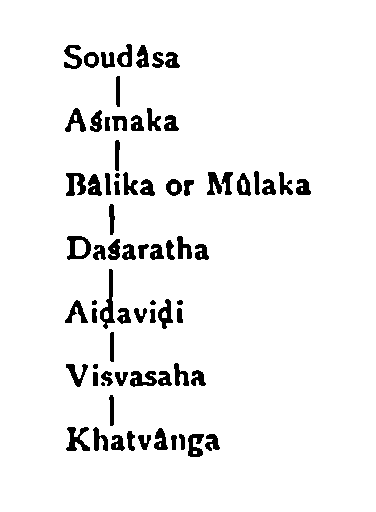
Soudâsa
|
Aśmaka
|
Bâlika or Mûlaka
|
Daśaratha
|
Aidavidi
|
Visvasaha
|
Khatvânga
Khatvânga was a very powerful king. He killed Daityas as a friend of the Devas. The Devas offered him a boon. The king wanted to know how much longer he was to live. Learning it was a Muhurta only, he returned forthwith to his place and concentrated his mind on Bhagavân. He attained Mukti.
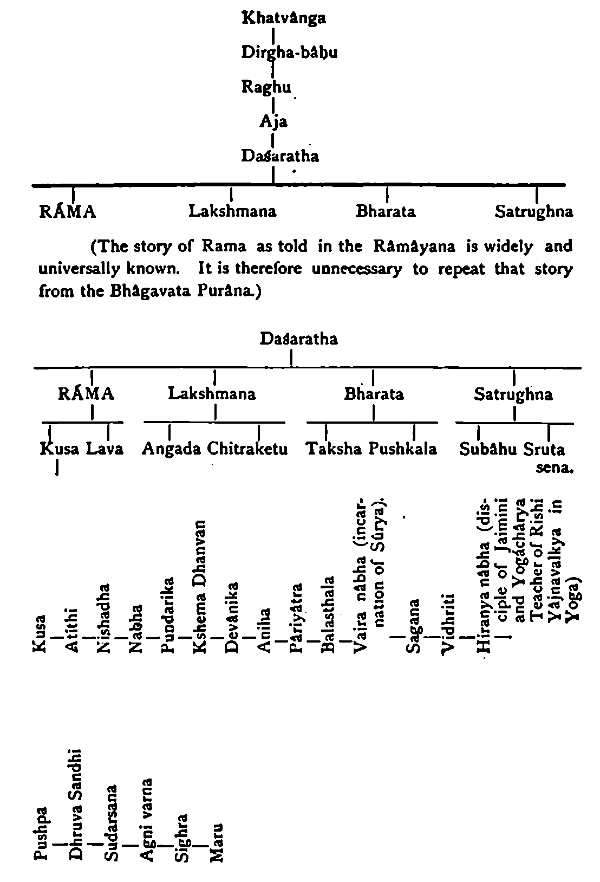
Khatvânga
|
Dirgha-bâhu
|
Raghu
|
Aja
|
Daśaratha
|
--+-+------+-----------+------------+--
| | | |
RÂMA Lakshmana Bharata Satrughna
(The story of Râma as told in the Râmâyana is widely and universally known. It is therefore unnecessary to repeat that story from the Bhâgavata Purâna.)
Daśaratha
|
--+---+-------------+-------------+--------------+---
| | | |
RÂMA Lakshmana Bharata Satrughna
| | | |
+-----+ --+----+-----+-- --+-------+-- --+--------+--
| | | | | | | |
Kusa Lava Angada Chitraketu Taksha Pushkala Subâhu Srutasena.
Pushpa Kusa
| |
Dhruva Sandhi Atithi
| |
Sudarsana Nishada
| |
Agni varna Nabha
| |
Sighra Pundarika
| |
Maru Kshema Dhanvan
|
Devânika
|
Aniha
|
Pâriyâtra
|
Balasthala
|
Vajra nâbha (incarnation
of Sûrya).
|
Sagana
|
Vidhriti
|
Hiranya nâbha (disciple
of Jaimini and
Yogachârya
Teacher of Rishi
Yâjnavalka in
Yoga)
Manu has matured in Yoga. He now resides at Kalapa. Towards the end of Kaliyuga he shall restore the Solar dynasty.
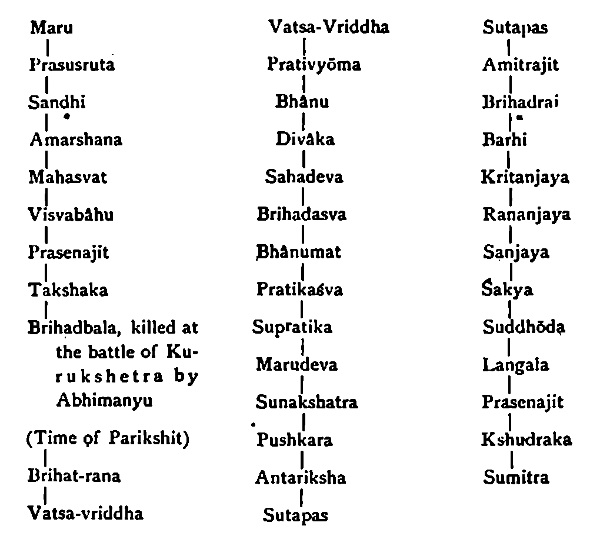
Maru Vatsa-Vriddha Sutapas
| | |
Prasusruta Prativyōma Amitrajit
| | |
Sandhi Bhânu Bridharaj
| | |
Amarshana Divâka Barhi
| | |
Mahasvat Sahadeva Kritanjaya
| | |
Visvabâhu Brihadasva Rananjaya
| | |
Prasenajit Bhânumat Sanjaya
| | |
Takshaka Pratikaśva Śakya
| | |
Brihadbala, killed Supratika Suddhōda
at the battle of | |
Kurukshetra by Marudeva Langala
Abhimanyu | |
Sunakshatra Prasenajit
(Time of Parikshit) | |
| Pushkara Kshudraka
Brihat-rana | |
| Antariksha Sumitra
Vatsa-vriddha |
Sutapas
Sumitra shall be the last of the Ikshvâku dynasty in this Kali Yuga.
Nimi was the second son of Ikshvâku. He asked Vasistha to officiate at his Yajna. But the Rishi had been pre-engaged with Indra. So he asked the king to wait till he came back. Considering the uncertainty, Nimi did not wait for his family Purohita. But engaged another priest. Vasistha on returning became offended and cursed Nimi with the loss of his body. Nimi gave the same curse to Vasistha. So both gave up their bodies. Vasistha was reborn shortly after as the son of Mitravaruna by Urvasi. The Rishis picked up the body of Nimi and placed it with the scented things of Yajna. On the completion of the Yajna, the Rishis prayed to the Devas for the vivification of the body. But Nimi said from within the scented things that he did not want to be encumbered with the body any more. The Devas said: "Then remain in the eyes of all beings as winking." So Nimi remains in the twinkling of eyes.
The Rishis churned the body of Nimi and a son was born. He was called Janaka. As he was born, when his father was bodiless (videha) he was also called Vaideha. The churning also gave him the name of Mithila (Manth = to churn). He built the town Milhilâ. (Mithilâ is the modern Tirhut).
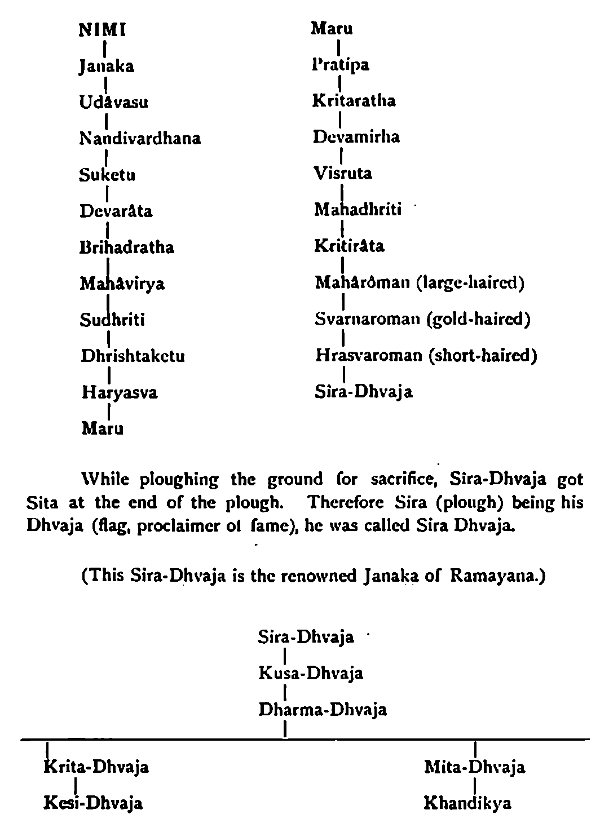
NIMI Marti
| |
Janaka Pratipa
| |
Udâvasu Kritaratha
| |
Nandivardhana Devamirha
| |
Suketu Visruta
| |
Devarâta Mahadhriti
| |
Brihadratha Kritirâta
| |
Mahâvirya Mahârôman (large-haired)
| |
Sudhriti Svarnaroman (gold-haired)
| |
Dhrishtaketu Hrasvaroman (short-haired)
| |
Haryasva Sira-Dhvaja
|
Maru
While ploughing the ground for sacrifice, Sira-Dhvaja got Sita at the end of the plough. Therefore Sira (plough) being his Dhvaja (flag, proclaimer of fame), he was called Sira Dhvaja.
(This Sira-Dhvaja is the renowned Janaka of Râmayana.):
Sira-Dhvaja
|
Kusa-Dhvaja
|
Dharma-Dhvaja
|
--+-+---------------+---
| |
Krita-Dhvaja Mita-Dhvaja
| |
Kesi-Dhvaja Khandikya
Kesi Dhvaja was versed in Âtmâ-vidya, Khandikya was versed in Vedic Karma, Kesi Dhvaja overpowered Khandikya and he fled away.
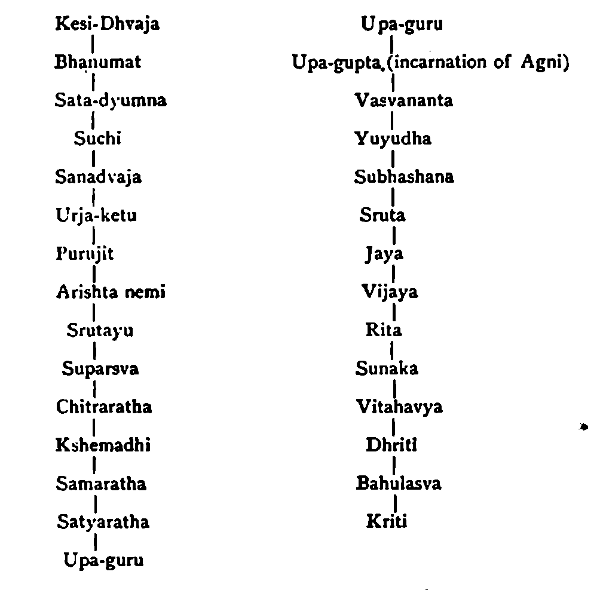
Kesi-Dhvaja Upa-guru
| |
Bhanumat Upa-gupta (incarnation of Agni)
| |
Sata-dyumna Vasvananta
| |
Suchi Yuyudha
| |
Sanadvaja Subhashana
| |
Urja-ketu Sruta
| |
Purujit Jaya
| |
Arishta nemi Vijaya
| |
Srutayu Rita
| |
Suparsva Sunaka
| |
Chitraratha Vitahavya
| |
Kshemadhî Dhriti
| |
Samaratha Bahulasva
| |
Satyaratha Kriti
|
Upa-guru
These kings of Mithila were well versed in Âtmâ-vidya.
No hay comentarios:
Publicar un comentario